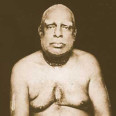Continuing our presentation of the recent release Sharanagati, in this song Srila Bhakti Vinod Thakur describes how a surrendered soul prays to Sri Guru for entrance in Sriman Mahaprabhu’s sankirtan-lila in Nadia.
gurudeva! kabe tava karuṇā prakāśe
śrī-gaurāṅga-līlā, haya nitya-tattva,
ei dṛḍha viśvāse
‘hari’ ‘hari’ bali’, godruma-kānane,
bhramiba darśana-āśe [1]
gurudeva!–O spiritual master!; kabe–when?; tava–your; karuṇā–mercy; prakāśe–by the manifestation; śrī-gaurāṅga–of Śrīman Mahāprabhu; līlā–the Pastimes; haya–become; nitya–eternal; tattva–truth; ei–this; dṛḍha–firm; viśvāse–with faith; hari–Name of ‘Hari’; hari–Name of ‘Hari’; bali’–calling; godruma–of the island known as ‘Godrum’; kānane–in the forest; bhramiba–I will wander; darśana (bahir-darśana)–to see (to see outwardly before me); āśe–with the desire. [1]
(1) O Gurudev! When, by the manifestation of your mercy, will I have firm faith in the eternal truth of Sri Gauranga’s Pastimes, and wander amid the forest of Sri Godrumdwip calling out, “Hari!” “Hari!” in hope of beholding those Pastimes before me?
nitāi gaurāṅga, advaita śrīvāsa,
gadādhara pañcha-jana
kṛṣṇa-nāma-rase, bhāsā’be jagat,
kari’ mahā-saṅkīrtana [2]
nitāi–Śrī Nityānanda Prabhu; gaurāṅga–Śrīman Mahāprabhu; advaita–Śrī Advaita Prabhu; śrīvāsa–Śrīvās Ṭhākur; gadādhara–Gadādhar Paṇḍit; pañcha–five; jana–persons; kṛṣṇa–of Kṛṣṇa; nāma–the Names; rase–with the nectar; bhāsā’be–will make float; jagat (bhuvana)–the universe (the world); kari’–doing; mahā–great; saṅkīrtana–congregational chanting. [2]
(2) Sri Nityananda Prabhu, Sri Gauranga Mahaprabhu, Sri Advaita Prabhu, Sri Srivas Thakur, and Sri Gadadhar Pandit—these five great personages will inundate the world with the rasa of Krishna’s Name by performing mahasankirtan.
nartana-vilāsa, mṛdaṅga-vādana,
śuniba āpana-kāṇe
dekhiyā dekhiyā, se līlā-mādhurī,
bhāsiba premera vāne [3]
nartana–of dancing; vilāsa–Pastimes; mṛdaṅga–of the clay drum; vādana–sound; śuniba–I will hear; āpana–my own; kāṇe–with the ears; dekhiyā–seeing; dekhiyā–and seeing; se–those; līlā–of the Pastimes; mādhurī–sweetness; bhāsiba–I will float; premera–of divine love; vāne–in a flood. [3]
(3) I will hear with my own ears the sounds of the mridanga and the movements of Their dancing. Beholding the sweet beauty of such Pastimes, I will float in a flood of prema.
nā dekhi’ ābāra, se līlā-ratana,
kā̐di ‘hā gaurāṅga!’ bali’
āmāre viṣayī, ‘pāgala’ baliyā,
aṅgete dibeka dhūli [4]
nā–not; dekhi’–seeing; ābāra–again; se–these; līlā–Pastimes; ratana–jewel-like; kā̐di–I cry; hā–oh!; gaurāṅga–the name ‘Gaurāṅga’; bali’–calling; āmāre–to me; viṣayī–materialists; pāgala–a madman; baliyā–calling; aṅgete–on my body; dibeka–will put; dhūli–dust. [4]
(4) Again, not seeing those jewel-like Pastimes before me, I will cry, calling out, “O Gauranga!” Considering me a madman, materialists will kick dust upon my body.
Sri Laghu-chandrika-bhashya
(4) ‘pāgala’ baliyā: “Considering me a madman.” Sarvabhauma Bhattacharya has similarly declared:
parivadatu jano yathā tathāyaṁ
nanu mukharo na vayaṁ vichārayāmaḥ
hari-rasa-madirā-madātimattā
bhuvi viluṭhāma naṭāma nirviśāmaḥ
(Padyavali: 73)
“Let the garrulous masses criticise us howsoever they please; we will not consider their words. Wildly intoxicated by drinking the wine of the rasa of the Lord, we will dance, roll on the ground, and faint.”
